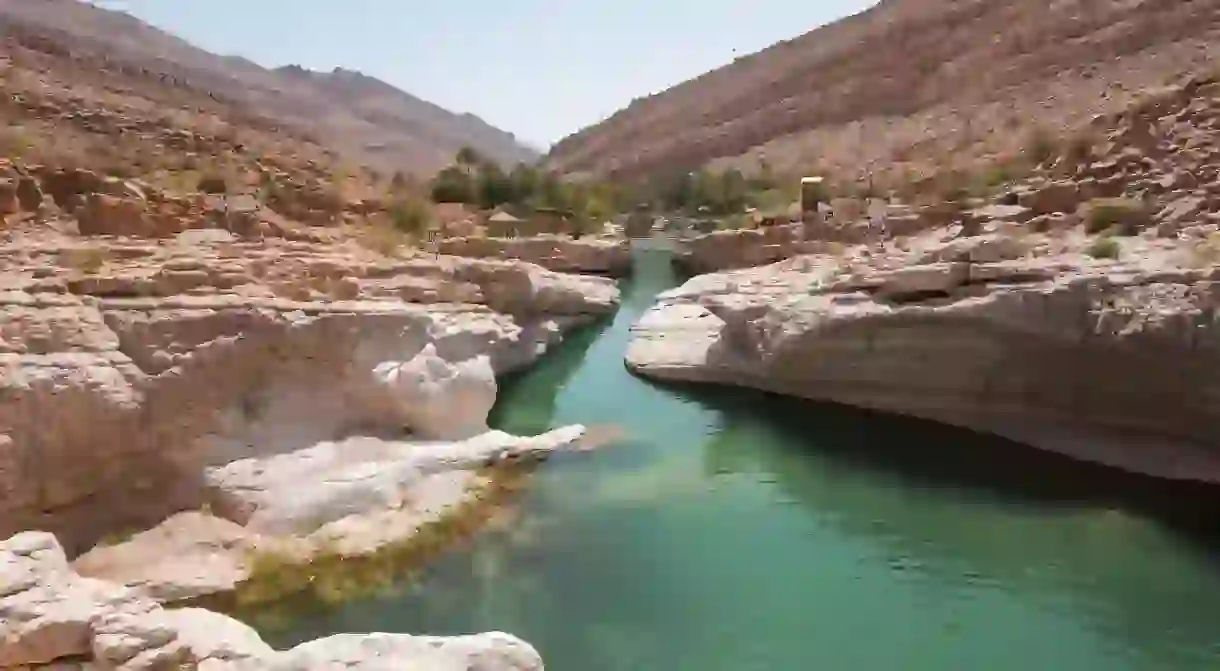Four Beautiful Wadis to Visit Near Muscat, Oman

Wadis, natural oases formed in streams and valleys, are often perfect open-water swimming locations. Here are four of the best near Muscat, Oman.
There are a many beautiful wadis and oases within easy access of Oman’s capital city of Muscat. These luscious river beds and mountainous rock pools are an ideal retreat from the heat and offer cool emerald waters, fringed by date palms. Free to enter, visitors can spend as much time as they like wading between the natural pools. Afternoons and weekends in Oman see locals barbecuing by the water’s edge or picnicking in the shade of ginormous boulders, trees or gazebos. Pack a picnic basket, swimming gear and sunscreen, and get out of Muscat for an outdoor adventure.
Notice boards at the entrances of wadis, swimming sites and public beaches indicate the suitable dress code when swimming in public and among locals, many of whom may be deeply devout Muslims. As a visitor, it’s important to be respectful of the culture. Women are requested to cover their shoulders and knees. If you don’t have a wet suit or a burkini, try wearing a T-shirt and yoga pants over your swimming costume, or lightweight and breathable hiking gear which will dry quickly.
Men are also requested to wear longer swimming trunks or board shorts rather than speedos. They should also wear a T-shirt rather than swimming shirtless. Even if you don’t see any visible dress-code notices, it’s a sign of respect to dress modestly nonetheless.
Bimmah Sinkhole

A staircase leads to the cerulean waters at the limestone-encased Bimmah Sinkhole, with waters that reach 20m (65.5ft) at their deepest point. “Omanis claim that the Bayt Al Afreet sinkhole in Bimmah was created when shooting stars or meteorites hurtled into the Earth,” explains Hilal Al Ghadani, owner and guide at Desert Flower Tours. The sinkhole is found within Hawiyat Najm Park, which translates as “the deep well of the falling star”. The brackish water is warm year-round and is the perfect place to cool off in the heat, followed by a barbecue or picnic in the shade.
Wadi Al Shab

A short boat trip across the river and a 45-minute walk through a shallow canyon brings you to Wadi Al Shab, where you can swim between three spectacularly turquoise rock pools.
In some parts of this wadi, you have to get out and walk over stones that have been shaped over centuries by constantly flowing water, so it’s advisable to wear sandals or dive boots. The final stage of this natural obstacle course is a tight squeeze at head level through a narrow, dark crevice between boulders that opens up to a sunshine-filled watery cavern with a waterfall. Those in search of an adrenaline rush can climb up the boulder with the help of a knotted rope and dive into the water below.
As you walk back to the boat, observe how the water is channeled to the neighbouring villages and farmlands using ancient Falaj irrigation systems that make use of gravitational pull, some dating back 5,000 years.
Want to visit two beautiful Wadis in one trip? Book your tour now
Wadi Al Arbaeen

Located around 90-minutes’ drive from Muscat, Wadi Dayqah is the largest dam in Oman, and one of the largest on the entire Arabian Peninsula. Set in a beautiful limestone valley, a drive along its twisting hairpin bends will bring you to the emerald waters of Wadi Al Arbaeen. Swim, barbecue and picnic or, if you’re the adventurous type, check out the two canyoning trails which snake around the crystal-clear wadi – they’re tough, but the reward is a soundtrack of cascading water, interconnected rock pools and stunning landscapes.
Wadi Hoqain
Put aside a full day for an excursion to Wadi Hoqain. Begin by dipping your feet into the Al Thowarah hot springs in Nakhal for a ticklish on-the-go pedicure by the resident fish, before continuing along the road that ends in the heart of date plantations, within which you’ll find Wadi Hoqain, affectionately known as Oman’s waterfall village for its year-round cascade.
No matter which road you choose, there’s plenty to explore – from the ancient Falaj Al Muyassar irrigation system, one of five UNESCO-listed Aflaj systems, to Rustaq Fort and the renovated 18th-century Al Hazm Castle, which was constructed without the use of wooden rafters for its ceilings. The latter two sites are on the tentative list for UNESCO World Heritage classification, if you still need some convincing.
Embark on this expedition to combine off-roading through the northern Al Hajar Mountains, with photogenic water crossings, a little bit of history and culture, plus some down-time at the water’s edge.













